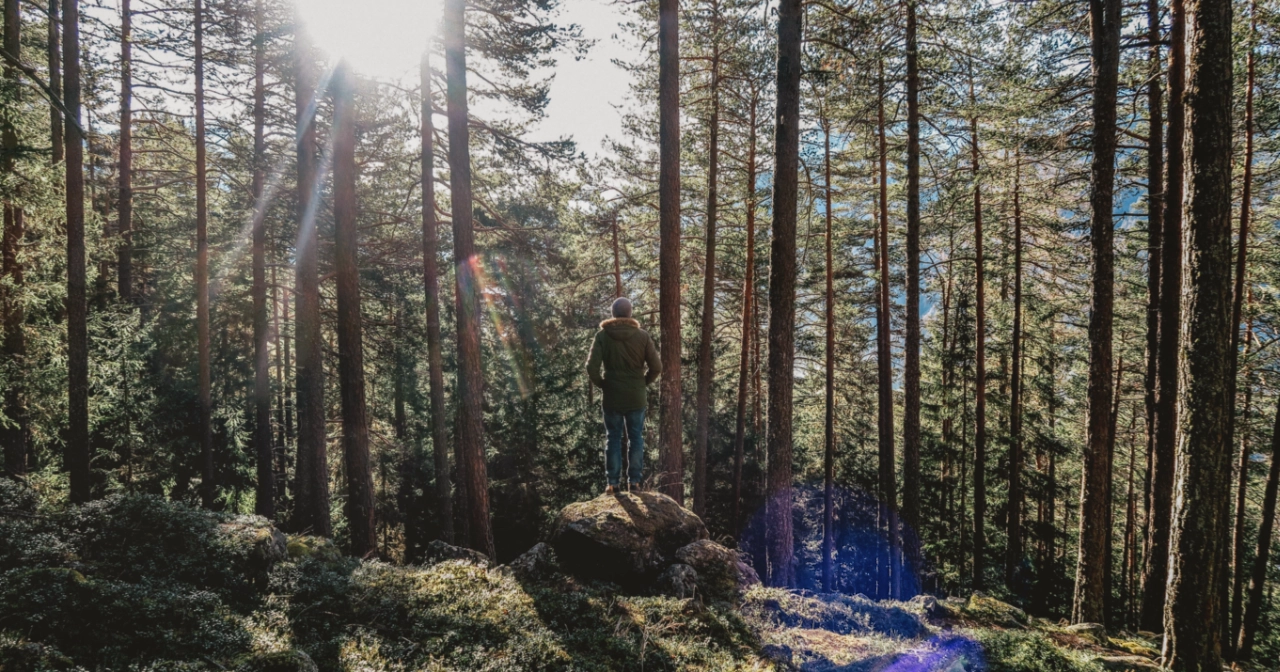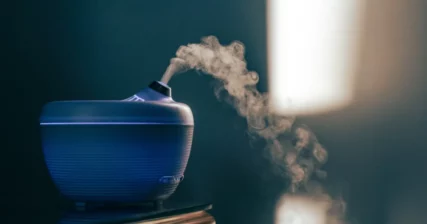For the past couple of weeks, I’ve diffused a blend of evergreen essential oils at bedtime each night.
I already had a pretty effective sleep regimen prior to diffusing this blend, so I wasn’t expecting much of a change. Was I ever wrong!
I’ve slept the same number of hours, but my sleep has been much deeper and my dreams more vivid. Most unexpected, I feel like I’m recovering from my workouts much faster.
Based on what I’ve experienced, I thought I’d delve into the research on evergreen essential oils and other compounds and their effects on our nervous systems, relaxation, and sleep.
Forest Bathing and Inhaling Evergreen Tree Oils
The Japanese have practiced forest bathing for centuries. They understood the relaxing effects of casually strolling through an evergreen forest and breathing in the essential oils the trees release.
The practice is also known as “forest healing,” “forest therapy,” or “shinrin-yoku.”
Well-documented benefits of forest bathing include:
- Increased levels of natural killer cells
- Enhanced immune function
- Improved psychological wellbeing
- Increased parasympathetic nervous system activity
- Decreased sympathetic (fight or flight) nervous system activity
Relevant to recent times…
Many possible therapeutic uses for forest bathing are utilized against COVID-19 in current global events. BVOCs (biogenic volatile organic compounds) could be useful in the prevention and/or treatment of COVID-19. Forest bathing, accompanied by walking in forests, is considered a beneficial practice against COVID-19-related disorders.
Roviello V, et al.
That’s not to say that walking through any forest and forgetting the fast-paced life of modern society isn’t good for you. It certainly is.
And there are other essential oils you may encounter as you walk through other forests.
For example, walking around our 5-acre lot, you’ll encounter wild bergamot, goldenrod, white pine, Norway pine, Norway spruce, and other plants and trees commonly used for essential oil production. My personal favorite in our woods is the black cherry tree, which releases an intoxicating, sweet aroma when I cut or chip it.
Each plant produces dozens to hundreds of different constituents, which have varying effects on human physiology.
Getting back to forest bathing, though, evergreen forests seem to have the greatest physiological impact. Or, maybe they’ve just been studied the most.
How do Evergreen Essential Oils Affect Humans?
Each evergreen produces different constituents, which help it resist pests and diseases, tolerate heat or cold, and deal with other factors that affect its survivability. Some of those compounds have positive effects on humans.
Cypress produces phytoncide, fir trees produce trans-caryophyllene and bornyl acetate, and pine trees produce α-pinene, all of which have been shown to help humans relax and feel calmer. They make hundreds of other compounds, which have various effects on your physiology as well.
D-limonene, another constituent common in evergreen trees and numerous plants, causes relaxation, among many other health benefits.
Some of the more recent research findings on evergreen essential oils and relaxation in humans include the following:
- In middle-aged women, one study showed that fir essential oil inhalation had a positive effect on stress levels, sleep quality, and feelings of fatigue.
- Office workers who inhaled fir essential oil experienced decreased sympathetic nervous system activity and lowered heart rate and blood pressure.
- A 2022 study with 26 university students showed that fir essential oil inhalation improved mood and vigor.
- Twelve middle-aged males stayed in a hotel for three nights. Their rooms included diffusers filled with hinoki cypress essential oil. They experienced higher natural killer cells, a marker of immune system strength, and lower adrenaline and noradrenaline, markers of sympathetic nervous system activity. Basically, they had less stress and stronger immune systems.
- Inhalation of essential oils released by Japanese cedar wood chips lowered total hemoglobin and decreased systolic blood pressure, suggesting it had a relaxing effect on the participants.
Read also: Essential Oils For Fitness: Research, Anecdotal Evidence, Experimentation.
Summary
The number of studies may not be that impressive if you compare the amount of research on evergreen essential oils to others, such as lavender, neroli, bergamot, tangerine, or rose. However, the existing research itself is impressive.
And while the above studies didn’t specifically look at sleep, it makes sense that if the oils make you more relaxed and reduce sympathetic nervous system activity, they’d also help you get better quality sleep.
In addition, many of the most-studied relaxation and sleep-inducing essential oils smell more feminine. The evergreen essential oils definitely have a more masculine appeal to them. Maybe that’s part of the reason men resonate with the lumberjack vibe. We like the idea of living amongst the evergreen as much as we appreciate the muscle, strength, and stamina needed to swing an ax all day.
As for me, I’ll keep diffusing my evergreen essential oils, especially when I don’t have the time to get out in the woods.
Photo by Paul Pastourmatzis on Unsplash
References
Assay of Terpene Compounds Contained in The Tree for Forest Healing. https://jppe.ppe.or.kr/journal/view.php?doi=10.11628/ksppe.2015.18.4.333. Accessed 13 July 2022.
Effects of Fragrance Components of Abies Holophylla Max. on Stress Relief and Improvement of Vascular Function. https://jppe.ppe.or.kr/journal/view.php?doi=10.11628/ksppe.2018.21.3.223. Accessed 13 July 2022.
Hong, Jong-Suk, et al. “Effects of the Aromatherapy Program Using Fir Needle Essential Oil on Stress, Sleep Quality and Fatigue in Middle-Aged Women.” Journal of People, Plants, and Environment, vol. 21, no. 5, Oct. 2018, pp. 433–43.
Kawakami, Kohei, et al. “Effects of Phytoncides on Blood Pressure Under Restraint Stress in Shrsp.” Clinical and Experimental Pharmacology and Physiology, vol. 31, no. s2, 2004, pp. S27–28. Wiley Online Library, https://doi.org/10.1111/j.1440-1681.2004.04102.x.
Kim, Choyun, and Chorong Song. “Physiological and Psychological Relaxation Effects of Fir Essential Oil on University Students.” International Journal of Environmental Research and Public Health, vol. 19, no. 9, Apr. 2022, p. 5063. PubMed Central, https://doi.org/10.3390/ijerph19095063.
Li, Q., et al. “Effect of Phytoncide from Trees on Human Natural Killer Cell Function.” International Journal of Immunopathology and Pharmacology, vol. 22, no. 4, Dec. 2009, pp. 951–59. PubMed, https://doi.org/10.1177/039463200902200410.
Roviello, Valentina, et al. “Forest-Bathing and Physical Activity as Weapons against COVID-19: A Review.” Environmental Chemistry Letters, vol. 20, no. 1, 2022, pp. 131–40. PubMed Central, https://doi.org/10.1007/s10311-021-01321-9.



